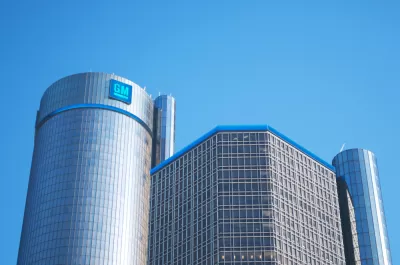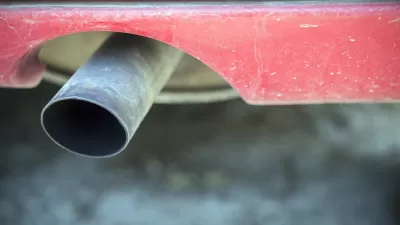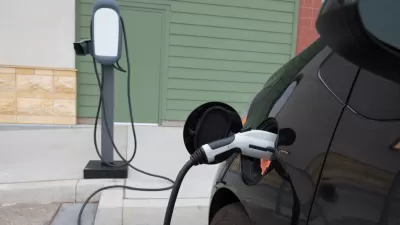The auto industry is divided on whether to back stronger emissions standard adopted by California and 13 other states. Three major automakers and three auto industry groups sided with Trump on Monday in a court battle over 'one national standard.'

"President Donald Trump has scored a key victory over California and Gov. Gavin Newsom in their increasingly nasty fight over climate change [corresponding post in Planetizen] and rules limiting greenhouse gas emissions from cars," report Dale Kasler and Michael Wilner for The Sacramento Bee
The Association of Global Automakers and the Coalition for Sustainable Automotive Regulation — a group including GM, Toyota, Mazda, Fiat Chrysler and Mitsubishi — split with four other automakers that had agreed to follow tougher rules enacted by California.
“The certainty of one national program [see final rule by EPA+NHTSA], with reasonable, achievable standards, is the surest way to reduce emissions in the timeliest manner,” John Bozzella, the head of the coalition, said in a statement. “With our industry facing the possibility of multiple, overlapping and inconsistent standards that drive up costs and penalize consumers, we had an obligation to intervene.”
"In their filing [pdf] with the U.S. Court of Appeals for the District of Columbia [on Oct. 28], the automakers and the National Automobile Dealers Association said they backed the administration bid to bar individual emissions rules by states," writes David Shepardson for Reuters (source article). "The decision to side with President Donald Trump could prompt a furious backlash from Democrats and environmentalists."
Senator Tom Carper [of Delaware], the top Democrat on the Senate Environment and Public Works Committee, had harsh words for the automakers.
“Instead of choosing the responsible path forged by four automakers and the state of California, one that will move us toward the cleaner, alternative fuel vehicles of the future, these companies have chosen to head down a dead-end road,” Carper said in a statement.
The Sierra Club reacted similarly. "Shame on these automakers who support the Trump Administration’s illegal and dangerous attack on state authority, clean air, and climate progress," stated Gina Coplon-Newfield, Director of the Sierra Club’s Clean Transportation for All campaign.“
Eight prominent environmental organizations, including the Environmental Defense Fund and the Sierra Club, and Public Citizen, filed suit [pdf] against Secretary of Transportation Elaine Chao on Sept. 27 over the revocation of the Clean Air Act waiver allowing California to adopt stricter motor vehicle emissions standards. It is that lawsuit, Environmental Defense Fund, Petitioner, V. National Highway Traffic Safety Administration, Respondent [pdf] in which the Coalition for Sustainable Automotive Regulation and the Association of Global Automakers intervened rather than the 23-state lawsuit, led by California and 22 other states, the District of Columbia, and the cities of NY and LA, filed against the National Highway Traffic Safety Administration (NHTSA) on Sept. 20. [See 'update' at the base of the post].
Toyota draws special attention
Tiffany Hsu of The New York Times writes about a possible backlash by California consumers against Toyota, long associated with being an environmentally-conscious company due to its Prius line of hybrid-electric and plug-in hybrid-electric vehicles. In 2012, the Prius was the best-selling car in the Golden State.
Date to watch: November 24
On Sept. 19, the U.S. Environmental Protection Agency and National Highway Traffic Safety Administration, Department of Transportation announced the "Final Rule: One National Program on Federal Preemption of State Fuel Economy Standards:
This action finalizes critical parts of the Safer, Affordable, Fuel-Efficient (SAFE) Vehicles Rule that was first proposed in August 2018. This action makes clear that federal law preempts state and local tailpipe greenhouse gas (GHG) emissions standards as well as zero emission vehicle (ZEV) mandates.
The rule was published Sept. 27 in the Federal Register which indicates that the rule takes effect on November 24. As posted on Sept 21, "Did the Outlook for Electric Vehicle Sales in U.S. Just Nosedive?" this means that the California Zero-Emission Vehicle (ZEV) Program, and the ZEV programs in the ten Section 177 (of the Clean Air Act) States that have adopted the California ZEV standard: Connecticut, Maine, Maryland, Massachusetts, New Jersey, New York, Oregon, Rhode Island, Vermont, and most recently, Colorado, essentially become suspended as the requirements can no legally be enforced.
Los Angeles Times business columnist Michael Hiltzik penned two excellent columns on the auto industry intervention on behalf of the Trump administration:
- Oct. 31: Column: Some automakers taking Trump’s side in emissions fight have the worst records on pollution [he cites Sean Hect's Legal Planet blog post]
- Oct. 29: Column: By siding with Trump on emissions, GM, Chrysler and Toyota are asking for industry chaos
Update: David Shepardson of Reuters reports on Oct. 31 that on late Thursday night, the same automakers "sought to intervene on the side of the Trump administration in two additional legal challenges to its efforts to bar California from setting tailpipe emissions standards."
Related in Planetizen:
- California's zero-emission standard, which applies to ten other states, is essentially on hold, September 21, 2019
-
California's Ability to Set Auto Emissions Standards to Be Revoked, September 19, 2019
- Four Automakers Make Private Deal with California on Emissions Standards, July 29, 2019
- Auto Industry Reluctant to Support Trump Plan to Freeze Fuel Economy Standards, March 10, 2019
- Trump Administration Proposes to Freeze Fuel Economy Standards at 2020 Level, August 5, 2018
- California and Auto Industry Agree on Vehicle Emissions Standards, June 11, 2018
- Two auto associations have asked EPA to review the 54.5 mpg fuel efficiency target, February 25, 2017
FULL STORY: GM, Toyota, Fiat Chrysler Back Trump on California Emissions Challenge

Planetizen Federal Action Tracker
A weekly monitor of how Trump’s orders and actions are impacting planners and planning in America.

Maui's Vacation Rental Debate Turns Ugly
Verbal attacks, misinformation campaigns and fistfights plague a high-stakes debate to convert thousands of vacation rentals into long-term housing.

San Francisco Suspends Traffic Calming Amidst Record Deaths
Citing “a challenging fiscal landscape,” the city will cease the program on the heels of 42 traffic deaths, including 24 pedestrians.

Amtrak Rolls Out New Orleans to Alabama “Mardi Gras” Train
The new service will operate morning and evening departures between Mobile and New Orleans.

The Subversive Car-Free Guide to Trump's Great American Road Trip
Car-free ways to access Chicagoland’s best tourist attractions.

San Antonio and Austin are Fusing Into one Massive Megaregion
The region spanning the two central Texas cities is growing fast, posing challenges for local infrastructure and water supplies.
Urban Design for Planners 1: Software Tools
This six-course series explores essential urban design concepts using open source software and equips planners with the tools they need to participate fully in the urban design process.
Planning for Universal Design
Learn the tools for implementing Universal Design in planning regulations.
Heyer Gruel & Associates PA
JM Goldson LLC
Custer County Colorado
City of Camden Redevelopment Agency
City of Astoria
Transportation Research & Education Center (TREC) at Portland State University
Jefferson Parish Government
Camden Redevelopment Agency
City of Claremont




























